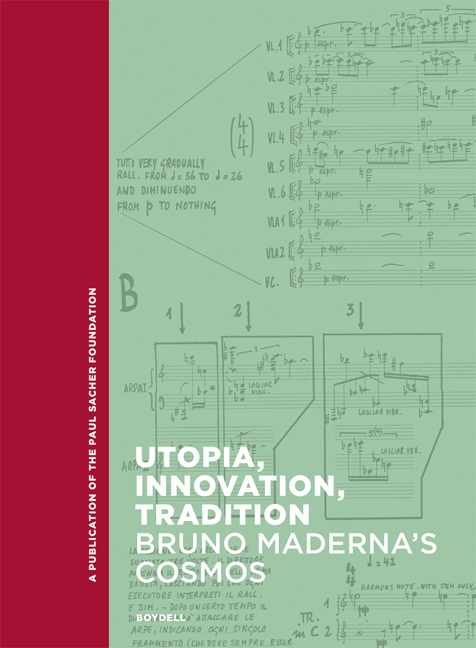Book contents
- Frontmatter
- Contents
- INTRODUCTION
- STAGING AND PERFORMING SOUNDS: A GLANCE THROUGH THE LAST THEATRICAL WORK
- BUILDING SOUNDS: THE COMPOSER
- CREATING SOUND: THE MUSIC BEYOND/WITHOUT THE STAGE
- REINVENTING SOUNDS: DIALOGUES WITH MUSIC OF EVERY EPOCH AND STYLE
- ACROSS BORDERS: THE CONDUCTOR AND THE INTERPRETER
- SEARCHING FOR ROOTS: THE DEVELOPMENT OF A STYLE
- STAGING AND PERFORMING TEXTS: A GLANCE THROUGH EARLY DRAMATURGICAL AND VOCAL WORKS
- Chronology Of Bruno Maderna’s Works
- Selected Bibliography
- Index
The Writing of the Interpretation: Notes on Bruno Maderna’s Arrangements
Published online by Cambridge University Press: 17 January 2024
- Frontmatter
- Contents
- INTRODUCTION
- STAGING AND PERFORMING SOUNDS: A GLANCE THROUGH THE LAST THEATRICAL WORK
- BUILDING SOUNDS: THE COMPOSER
- CREATING SOUND: THE MUSIC BEYOND/WITHOUT THE STAGE
- REINVENTING SOUNDS: DIALOGUES WITH MUSIC OF EVERY EPOCH AND STYLE
- ACROSS BORDERS: THE CONDUCTOR AND THE INTERPRETER
- SEARCHING FOR ROOTS: THE DEVELOPMENT OF A STYLE
- STAGING AND PERFORMING TEXTS: A GLANCE THROUGH EARLY DRAMATURGICAL AND VOCAL WORKS
- Chronology Of Bruno Maderna’s Works
- Selected Bibliography
- Index
Summary
Writing and interpretation: the way these two terms are used in the single syntagma of the title may almost seem oxymoronic, since they traditionally refer to the compositional act and interpretive activity as if they were two disjointed and autonomous contexts. That is to say, on the one hand, the fixation of a musical text on a support, to be consigned to posterity, and, on the other, its subsequent concretization into a sound artifact to be listened to. It could be said that these human products are set apart at the two extreme poles of this dialectic, since it is at these very extremes that their differences are best perceived and their basic distinction is easily grasped.
However, equidistant from these two poles lies an internal border region where the division is not so clear-cut, a place of interference and overlapping. We can think of cases where the definition of a musical text is more connected with the aural and oral experience than with the traditional process of writing; or other examples in which a virtuous circle of recursive logic is generated and strengthened between the dimensions of the event – the rehearsals, the concert performance, the studio recording – and those of the written production. This happens, for example, during rehearsals, when a conductor shapes the score in a series of progressive layers, as he or she comes into contact with the visual and auditory dimension of its interpretive realization. This annotated score can in turn become a new normative text, and thus liable to a new and particular interpretation. This essay aims to observe this creative process from a critical and dynamic point of view, that is to say, in the synthesis of the interference between the dialectic's two terrains as it comes into being.
It is never easy to use a critical approach to document this process. At times one feels that the writing itself is a container of a residual gap, which bears witness to traces of what is a far more complex and articulated conception. The truth is that not all musical parameters are so easily discretized by writing systems; just think of dynamics, agogics (and therefore temporal oscillations), and, above all, timbre. Timbre is, of course, the most essential element at the moment of interpretive realization, since it involves every other musical parameter – first and foremost, pitch and duration.
- Type
- Chapter
- Information
- Utopia, Innovation, TraditionBruno Maderna's Cosmos, pp. 193 - 226Publisher: Boydell & BrewerPrint publication year: 2023



